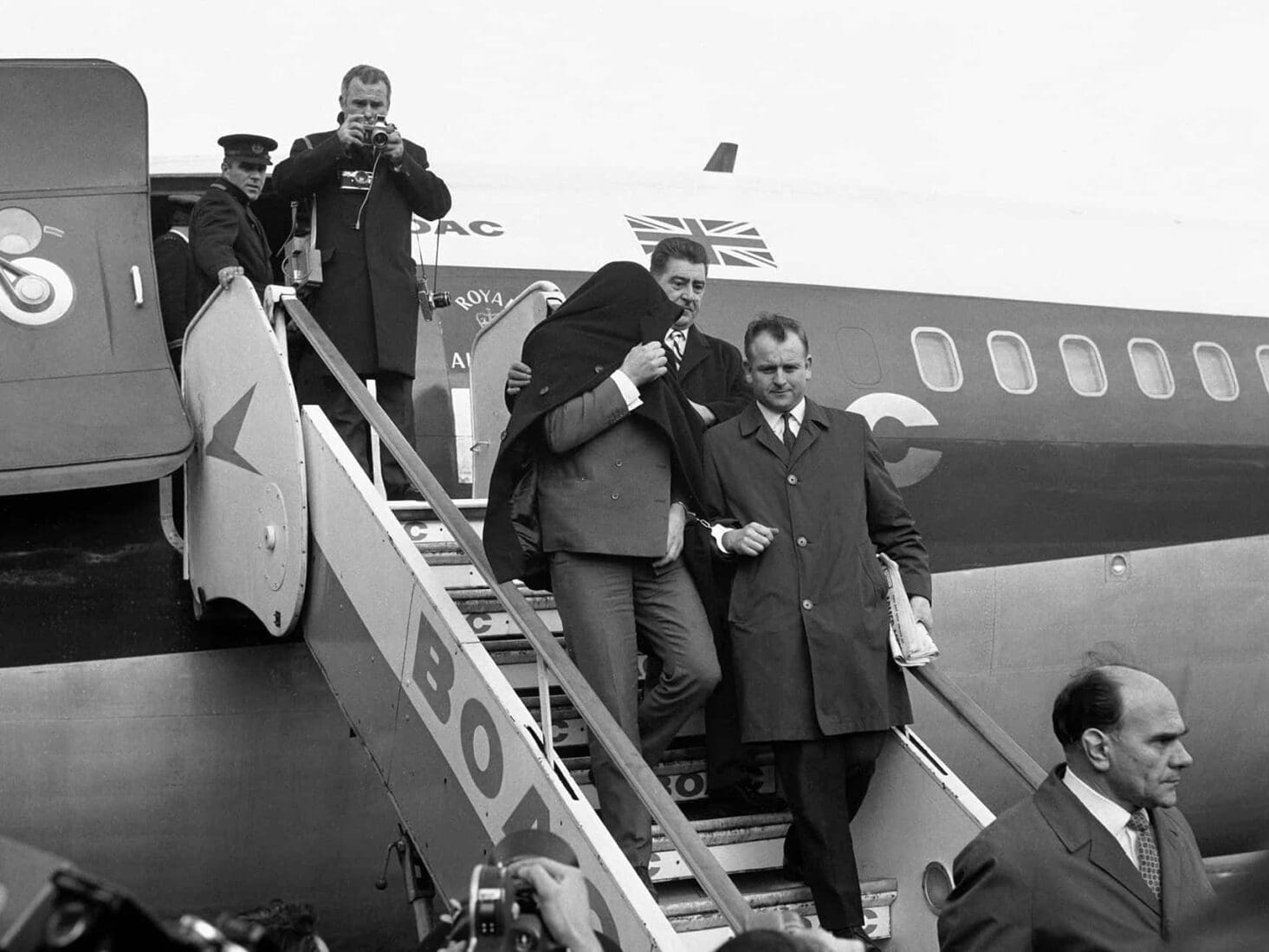
Charlie Wilson: The murky true story of the man behind the Great Train Robbery and Brinks Mat heist
33 years after his death, and with the story of Brinks Mat now a major BBC drama, The Gold, questions remain unanswered about Charlie Wilson’s extraordinary criminal career and inevitably bloody end
Charlie Wilson was chopping tomatoes and cucumbers for an al fresco BBQ lunch when the doorbell rang. It was another day of incendiary heat in Marbella in the late spring of 1990 and Wilson was taking his time with late lunch preparations. The insistent Mediterranean sun hovered high above his swimming pool and rendered his dog, Boo Boo, all but indolent, despite the aroma of smoking meat coming from the fire pit.
Security was tight at Wilson’s villa, which he shared with Pat, his wife of over three decades who was usually seen chain-smoking in the same, spacious back garden. Looking towards the villa from her position on the sun lounger, Pat would be reassured by the bars on every window. Wilson had also gone to great expense building a six-foot-high wall to surround their £500,000 turreted home. In a mocking nod to the UK government, which had failed to prevent his palatial life on the Costa del Crime, the property was named Chequers.
Wilson had always been a man who seemed to know exactly when to utilise his reserves of fearlessness – and when to keep quiet and display caution and reticence. Deployed (by most accounts) as the treasurer in the Great Train Robbery, almost 30 years previously, the presiding judge in the resulting trial summed up by telling Wilson: “No one has said less than you throughout this long trial. Indeed, I doubt if you have spoken half a dozen words.”
Escaping from prison after just four months, Wilson spent years on the lam in Canada before being extradited back to the UK. In 1978, he became the last of the GTR gang to be released but his abilities as an escape artist and a man who could be counted on to keep his mouth shut had remained legendary. He made an obvious choice to help clean up the aftermath of the Brinks Mat heist of November 1983, when armed robbers took gold bullion worth £93 million in today’s money from a supposedly secure trading estate safe near Heathrow Airport.
New BBC One drama The Gold, starring Hugh Bonneville, tells the full story of Brinks Mat and its bloody consequences. The narrative, perhaps understandably, focuses primarily on the role of Kenny Noye, chief launderer of the gold, who was later convicted of the violent road rage murder of an innocent motorbike rider in Kent.
Wilson’s role, as he no doubt would have preferred, has been relegated to a side story. Indeed, the only time that the ‘silent man’ involved in both of the most notorious heists in 20th-century British history hit the headlines in his own right was after the doorbell to his villa rang on that blazing summer’s day in 1990.
There are obvious questions to be asked as to why Wilson’s wife would have let a twenty-something man with badly bleached blonde hair, whose only introduction was that he had a message from ‘Eamon’, into the garden to see Wilson – especially given the couple’s usually stringent caution.
Walking out onto the lawn, the man engaged in a short conversation with Wilson before karate chopping him in the neck and firing a single bullet into his throat. Kicking Boo Boo so violently that the now bilious dog had to be put down, the man jumped over the high wall lining the garden and made a swift escape in a waiting van, though not before returning to the front of the house to collect the bicycle he had arrived on.
Wilson died in the back of an ambulance en route to the hospital. He was 57 years old and, for the first time, unable to escape being a headline name in every British newspaper. But, over three decades later, questions as to Wilson’s exact role in Brinks Mat, the motivation of his killer, and even the killer’s true identity are ones that are still shrouded in the murk of the underworld.
What seems clear is that Wilson was entrusted with laundering some of the Brinks Mat gold. Through a network of cocaine suppliers threaded across Europe all the way to Pablo Escobar’s cartel in Columbia, Wilson, for reasons never fully explained, appears to have ‘lost’ around £3 million of the Brinks Mat gold in a deal gone wrong.
Wilson may have had no involvement in the violence that day in November 1983 (indeed, he wasn’t part of the gang that broke into the vaults) but the loss of such a sizeable chunk of the Brinks Mat loot seems to have made Wilson the number one target of those who were. He was also still a ‘person of interest’ to police in both Spain and the UK, who never completely stopped surveilling Wilson even as he feigned a peaceful retirement in his Chequers retreat.

Danny ‘Scarface’ Roff was the name emblazoned across Britain’s tabloid newspapers as they scrabbled to identify the murderer in the days following Wilson’s funeral. The Spanish police believed that Roff was acting on orders from a violent cannabis smuggler called Roy Adkins, who had also become a key player in attempts to smelt, launder and invest the Brinks Mat bullion.
The theory goes that Adkins believed Wilson had given smuggler Jimmy Rose the go-ahead to tell police that a drug shipment he had been caught with belonged to Adkins. The ‘OK’ was given by Wilson after he had asked for confirmation from another Adkins associate called Eamon Evans – the very name used by Roff to gain admittance to Wilson’s back garden.
Jimmy Rose always denied fingering Adkins to the authorities. If Rose was telling the truth then it may have been pure coincidence that police raided Adkins’ Dutch hideout just two days after Wilson had called Evans. By this point, Adkins had vanished – but not before making it clear how furious he was with Wilson for his role in the near capture.
And so a three-decade-long, expanding miasma of ageing gangster feuds, half-truths, conspiracies and acts of vengeance continue to swirl around Wilson’s murder. The claims, counterclaims, threats and whispers have been sworn, denied and scrambled into an impenetrable pulp by an ensemble cast of some of London’s least trustworthy criminal veterans, many of whom followed Wilson’s maxim by taking their most coveted knowledge to the grave.
Yet nobody was ever even arrested for Wilson’s murder, let alone convicted. Indeed, the criminal fraternity proved far swifter than Interpol or Scotland Yard in enacting its own justice. Adkins was murdered just three months after Wilson. Roff was paralysed in a nightclub shooting in 1996 before being shot dead the following year on his own driveway while trying to move from the driver’s seat of his car to his wheelchair.
And yet there were those in the underworld who, for decades after Wilson’s death, refused to believe a word of this explanation of events. Jimmy Rose, still adamant that he didn’t pass on Adkins’ name to police when interviewed by author Wensley Clarkson 20 years after the heist, said that the murder could have been over nothing more than common or garden infidelity.
“Maybe that’s why the Spanish police didn’t pursue it,” he volunteered. “Maybe they thought that if it was because of a woman then… who knows?”
Juan Lorenzo, the now-retired head of the Spanish investigation team, also went on record with Clarkson a few years after the murder to claim that all that could have been done in Marbella to catch Wilson’s killers had been done.
“We’d tried everything and could not find enough evidence that Roff did it. In any case, the man who commissioned the hit (Adkins) was dead. It was difficult to know what to do next."
He later added, “I have to be honest about this. I don’t think we will ever see anyone go to court and be prosecuted now. It is too long ago.” However, many retired Scotland Yard Flying Squad detectives remain far from convinced as to the thoroughness of Lorenzo’s efforts on the ground at the time.
Ultimately, perhaps it would please Wilson (though provide little balm to his family) that his reputation as one of the ‘true gents of the old school’ of criminals survived the Great Train Robbery, Brinks Mat and even his own death. As Jimmy Rose claimed, “[Wilson] didn’t suffer fools gladly. He took the same attitude inside and outside. Get your bird done. Get in, then get out, then get on with the business."
Now resting in Streatham Hill cemetery, Wilson’s roles in two of the last century’s greatest crimes are still, and will probably always be, shrouded in mystery. Yet as the so-called Brinks Mat Curse continues to see murders connected to the now 40-year-old heist mount up, Wilson’s dedication to a life of crime is being slavishly followed by a new generation of questionable characters still on the hunt for the missing millions. ‘Business’, as Wilson described it, is still thriving…
The Gold is available to stream now on BBC iPlayer.






